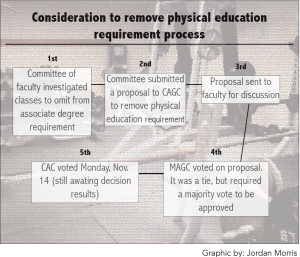PE credits will be nonexistent for your degree
By: Stephen Beuchter
Staff Writer
The College Academic Council has discussed the possibility of removing the two credit hours of physical education from the requirements for earning an associate degree from St. Louis Community College. This was done to make the program for an associate degree into a 60-hour program. The idea was brought forth by a task force made up of members from each campus who were dedicated to finding out where classes could be cut to reach the 60 hour mark, said Professor Margaret Hvatum.
The measure was not approved at individual
campus levels. “In order to be approved by Meramec Academic Government Council, it would require a simple majority. The proposal was not approved by Meramec Academic Governance Council. It was also not approved by Wildwood and not approved by Forest Park,” Hvatum said.
Coach Tony Dattoli from the Physical Education department said the number of students enrolled in P.E. classes shows definite interest in keeping the classes.
“I understand the desire to get our common core requirements to a certain number, but I think the numbers themselves of registrants shows that
there is a large number of our student population that likes taking Physical Education courses, not just because they satisfy their P.E. requirement, but because they’re also a great means of dealing with stress,” Dattoli said.
It is possible for campus representatives for the college’s wider College Academic Council to vote against the decision of each campus’ Governance Councils, but unlikely.
“Assuming that now three campuses have not approved it and it went to CAC we would think, probably, that CAC would not approve it, because traditionally delegates to the CAC reflect the votes of their campuses,” Hvatum said. “But we don’t know, it may be that the delegates choose to disregard how their campuses voted. They have that option although the campus that elected them to represent the campus may be quite unhappy with them if they voted differently.”
One of the more widely accepted possible changes to policy among staff, according to Professor Hvatum, is to make at least one of the required two hours of physical education credits into a wellness credit.
“Some Missouri colleges don’t allow those classes [P.E. credits] to transfer in, but that’s not true for all Missouri colleges and the majority of Missouri colleges do allow wellness credits to transfer in, so if the phys ed classes were to focus on wellness, for at least one of the credits, that would give more transfer opportunities for students transferring to Missouri four-year colleges,” Hvatum said. “I think we have such
an unbelievable opportunity to grow,” Dattoli said. “And I think that instead of addition by subtraction, so to speak, which is what at I think we’re looking at: trying to make our program better by eliminating, I think that — I don’t become a quicker runner by chopping off one of my toes, you know. I become a better runner by making the things I currently have better and more productive for me.”
A second-year student and major in Music Education, Robert Ewers, believes that the college should keep its two credit hour requirement for getting an associate degree from St. Louis Community College.
“It’s not gonna hurt you to be physically active,” Ewers said. “If people who are in a rush trying to get the degree done and those two credits are holding you back, yeah, but I’d say we should leave it for now. I’m not too worried about it.”
Francis, another student and a returning student and planned hospitality management major, was also against the removal of physical education requirements.
“I’m for physical education. I think it’s important that we maintain our healthy weight and exercise, get those endorphins going, get our heart rate up. That’s what I believe,” Francis said.
The Governance Council voted to remove required P.E. credits from the Board of Trustees’ policy, not the individual degree programs. Board policy does not necessarily cause instantaneous changes at a campus level, and in this case, each individual program would need to decide whether to remove the requirement or not.
“In order to remove it from any programs, that change would have to go through the curriculum committees at the campus level and at the district level,” Hvatum said. “However, I would anticipate that if the requirement for two credit hours of Phys Ed was removed from board policy that many programs would remove it from their programs because we want our programs to be as efficient as possible so that students can graduate.”











